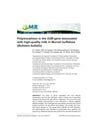 76 citations,
April 2005 in “Cancer Epidemiology, Biomarkers & Prevention”
76 citations,
April 2005 in “Cancer Epidemiology, Biomarkers & Prevention” E211 G>A gene linked to lower risk of severe prostate cancer and hair loss.
 5 citations,
March 2005 in “Journal of The American Academy of Dermatology”
5 citations,
March 2005 in “Journal of The American Academy of Dermatology”  8 citations,
October 2019 in “Immunological investigations”
8 citations,
October 2019 in “Immunological investigations” The AIRE gene variant rs2075876 is linked to a higher risk of alopecia areata in males.
 153 citations,
March 2017 in “Endocrine”
153 citations,
March 2017 in “Endocrine” Male pattern baldness involves genetics, hormones, and needs better treatments.
 36 citations,
January 2017 in “Journal of Obstetrics and Gynaecology Research”
36 citations,
January 2017 in “Journal of Obstetrics and Gynaecology Research” The review found no clear link between vitamin D receptor gene variations and polycystic ovary syndrome.
 32 citations,
February 2014 in “Psychopharmacology”
32 citations,
February 2014 in “Psychopharmacology” Dutasteride makes alcohol less sedating and may lead to less drinking in men.
 27 citations,
June 2013 in “Alcoholism: Clinical and Experimental Research”
27 citations,
June 2013 in “Alcoholism: Clinical and Experimental Research” Finasteride use may lead to less alcohol consumption in men with lasting sexual side effects.
 9 citations,
March 2020 in “Gene”
9 citations,
March 2020 in “Gene” Certain gene variants in estrogen receptors are linked to polycystic ovary syndrome, mainly affecting metabolism, in Tunisian women.
3 citations,
January 2020 in “Indian Journal of Dermatology” Certain gene variations in the Vitamin D Receptor are linked to higher risk of female hair loss.
3 citations,
April 2022 in “Biomolecules” Higher miR-34a levels and the A variant of the MIR-34A gene are linked to increased risk and severity of alopecia areata.
 May 2008 in “Hair transplant forum international”
May 2008 in “Hair transplant forum international” A genetic test can identify people at risk of male pattern baldness early, allowing for quicker treatment.
 9 citations,
February 2022 in “Nature communications”
9 citations,
February 2022 in “Nature communications” Rare changes in the KRT82 gene are linked to a higher risk of Alopecia Areata.
 39 citations,
May 2011 in “Human Immunology”
39 citations,
May 2011 in “Human Immunology” Genetics play a role in acne, but how exactly they contribute is not fully understood.
 1 citations,
June 2023 in “Genes”
1 citations,
June 2023 in “Genes” Hair loss from Alopecia Areata is caused by both genes and environment, with several treatments available but challenges in cost and relapse remain.
 March 2024 in “Skin research and technology”
March 2024 in “Skin research and technology” High CRP levels could indicate vitamin D deficiency in people with alopecia areata.
 100 citations,
September 2017 in “Molecular and Cellular Endocrinology”
100 citations,
September 2017 in “Molecular and Cellular Endocrinology” Male hormones and their receptors play a key role in hair loss and skin health, with potential new treatments being explored.
 48 citations,
January 2015 in “Indian Journal of Dermatology, Venereology and Leprology”
48 citations,
January 2015 in “Indian Journal of Dermatology, Venereology and Leprology” Vitamin D is important for skin health and can help treat psoriasis, atopic dermatitis, and vitiligo.
 7 citations,
May 2019 in “Journal of the Formosan Medical Association”
7 citations,
May 2019 in “Journal of the Formosan Medical Association” HSD3B1 gene variant and being overweight linked to hair loss in women with polycystic ovary syndrome.
 21 citations,
December 2013 in “Archives of Dermatological Research”
21 citations,
December 2013 in “Archives of Dermatological Research” No link found between new male baldness genes and female hair loss.
 231 citations,
July 2008 in “Nutrition reviews”
231 citations,
July 2008 in “Nutrition reviews” Diet changes can protect against harmful environmental effects on fetal development.
 7 citations,
July 2014 in “Reproductive Biomedicine Online”
7 citations,
July 2014 in “Reproductive Biomedicine Online” The length of CAG repeats in the androgen receptor gene is linked to ovarian reserve but does not affect how the ovaries respond to stimulation.
 5 citations,
January 2016 in “Genetics and molecular research”
5 citations,
January 2016 in “Genetics and molecular research” Certain genetic variations in the A2M gene are linked to better milk quality in Murrah buffaloes.
 54 citations,
August 2005 in “Alcohol”
54 citations,
August 2005 in “Alcohol” Finasteride affects alcohol intake in male mice, possibly due to neurosteroids.
 37 citations,
October 2015 in “European Journal of Human Genetics”
37 citations,
October 2015 in “European Journal of Human Genetics” Genetic data can predict male-pattern baldness with moderate accuracy, especially for early-onset cases in some European men.
 9 citations,
November 2012 in “Archives of Dermatological Research”
9 citations,
November 2012 in “Archives of Dermatological Research” MC4R gene variants not linked to female hair loss.
 4 citations,
December 2013 in “British Journal of Dermatology”
4 citations,
December 2013 in “British Journal of Dermatology” ESR2 gene linked to female-pattern hair loss.
 March 2018 in “Suez Canal University Medical Journal”
March 2018 in “Suez Canal University Medical Journal” NKG2D gene polymorphism doesn't affect SLE risk but may influence symptoms like rash and hair loss.
3 citations,
July 2023 in “Biomolecules” B2m-free HLA variants may be a new class of HLA important in immune responses and diseases.

Androgenetic alopecia, or hair loss, is caused by a mix of genetics, hormones, and environment, where testosterone affects hair growth and causes hair to become smaller and grow for a shorter time.
 5 citations,
October 2022 in “Heliyon”
5 citations,
October 2022 in “Heliyon” Polycystic ovary syndrome, a disorder causing menstrual issues and infertility, can be treated with lifestyle changes, medication, herbal remedies, surgery, and assisted reproductive techniques like artificial insemination and IVF.



























